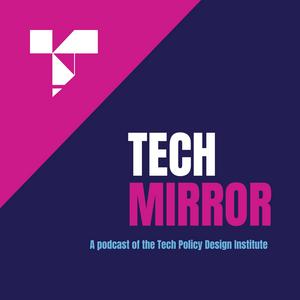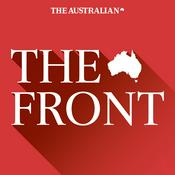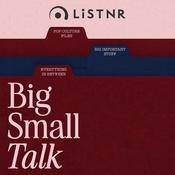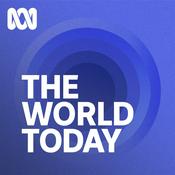50 episodes

Part 5: Next Steps - Australia vs Social Media
26/11/2025 | 35 mins.
This is the final episode of TPDi’s 5-part Tech Mirror mini-series, Australia vs Social Media: Inside the world-first online safety experiment. In this episode, we turn our attention to the future, looking at policy priorities for the Government going forward, including privacy law reform, a prohibition on unfair trading practices, competition codes, and the introduction of a digital duty of care. We also call on the Tech Mirror community to get involved and help shape Australian tech policy to make sure that it works well for everyone. Featured experts in this episode include Privacy Commissioner Carly Kind, Lizzie O’Shea from Digital Rights Watch, ACCC Chair Gina Cass-Gottlieb, eSafety Commissioner Julie Inman Grant, and clinical psychologist Dr Danielle Einstein, author of The Dip, the Einstein Report & Co-author of Raising Anxiety. Links: PM Press Conference at Parliament House (30 July 2025) https://www.youtube.com/watch?v=Zv-ZQ6jyLxw Children’s Online Privacy Code, via the Office of the Australian Information Commissioner https://www.oaic.gov.au/privacy/privacy-registers/privacy-codes/childrens-online-privacy-code Age appropriate design: a code of practice for online services, Information Commissioner’s Office (UK) https://ico.org.uk/for-organisations/uk-gdpr-guidance-and-resources/childrens-information/childrens-code-guidance-and-resources/age-appropriate-design-a-code-of-practice-for-online-services/ Regulatory reform in digital platform markets is needed to improve competition and consumer outcomes, via the ACCC (June 2025) https://www.accc.gov.au/media-release/regulatory-reform-in-digital-platform-markets-is-needed-to-improve-competition-and-consumer-outcomes Minister for Communications announcement of duty of care obligations (November 2024) https://minister.infrastructure.gov.au/rowland/media-release/new-duty-care-obligations-platforms-will-keep-australians-safer-online Statutory Review of the Online Safety Act 2021, led by Delia Rickard, released February 2025 https://minister.infrastructure.gov.au/rowland/media-release/report-online-safety-act-review-released Minister for Communications Press Conference regarding digital duty of care survey (November 2025): https://minister.infrastructure.gov.au/wells/transcript/press-conference-canberra-0 Minister for Communications media release on commitment to digital duty of care (November 2025) https://minister.infrastructure.gov.au/wells/media-release/government-continues-commitment-online-safety Government survey on digital duty of care online (November 2025) https://minister.infrastructure.gov.au/wells/media-release/government-continues-commitment-online-safety Credits Written and narrated by Johanna Weaver, Executive Director, Tech Policy Design Institute. Produced by Olivia O’Flynn & Kate Montague, Audiocraft. Research by Amy Denmeade. Original music by Thalia Skopellos. Created on the lands of the Ngunnawal, Ngambri people and the Gadigal people of the Eora Nation. Special thanks to all the team at the Tech Policy Design Institute, without whom the pod would not be possible, especially Zoe Hawkins, Meredith Hodgman, and Dorina Wittmann. See omnystudio.com/listener for privacy information.

Part 4: Implementation - Australia vs Social Media
21/11/2025 | 38 mins.
This is episode 4 of TPDi’s 5-part Tech Mirror mini-series, Australia vs Social Media: Inside the world-first online safety experiment. In this episode, we do a deep dive into the practicalities of implementing the Social Media Minimum Age legislation. What is likely to happen on 10th December when the law comes into effect? We answer some of the main questions that Australian young people and their parents and carers might have. We hear from the eSafety Commissioner Julie Inman Grant, Privacy Commissioner Carly Kind, deputy program director of the Age Assurance Technology Trial Andrew Hammond, clinical psychologist Dr Danielle Einstein, author of The Dip, the Einstein Report & Co-author of Raising Anxiety, Professor Amanda Third, co-director of the Young and Resilient Research Centre at Western Sydney University, and Minh Hoang, a member of the eSafety Commissioner’s Youth Advisory Council. Links: eSafety Commissioner’s Social Media age restrictions hub https://www.esafety.gov.au/about-us/industry-regulation/social-media-age-restrictions-hub eSafety appoints Stanford University-led academic advisory group to assess the impacts of the Social Media Minimum Age obligation (September 2025) https://www.esafety.gov.au/newsroom/media-releases/esafety-appoints-stanford-university-led-academic-advisory-group-to-assess-the-impacts-of-the-social-media-minimum-age-obligation Office of the Australian Information Commissioner (OAIC) resources on the social media minimum age https://www.oaic.gov.au/privacy/your-privacy-rights/social-media-minimum-age The Dip, founded by Dr Danielle Einstein https://www.thedip.com/ Young Men Online https://www.esafety.gov.au/research/young-men-online Cyberbullying https://www.esafety.gov.au/key-topics/cyberbullying Sextortion https://www.esafety.gov.au/key-topics/image-based-abuse/deal-with-sextortion Parental Controls https://www.esafety.gov.au/parents/issues-and-advice/parental-controls Press Conference: Social Media minimum Age Platform Assessments, Minister for Communications media release (November 2025) https://www.youtube.com/watch?v=b9CIZK_12Zc Meta announces it will begin implementing required changes from 4 December https://www.abc.net.au/news/2025-11-19/meta-to-block-teens-from-instagram-facebook-week-early/106028014 Family Tech Agreement Template (eSaftey, good for younger children): https://www.esafety.gov.au/parents/resources/family-tech-agreement Family Tech Contract (Think you know, good for teenagers): https://www.thinkuknow.org.au/find-advice/building-safe-online-habits Headspace guide to the social media ban https://headspace.org.au/our-impact/campaigns/social-media-ban/ ReachOut https://about.au.reachout.com/home Kids Helpline https://kidshelpline.com.au/ Lode a complaint with the Privacy Commissioner https://www.oaic.gov.au/privacy/your-privacy-rights/social-media-minimum-age Credits Written and narrated by Johanna Weaver, Executive Director, Tech Policy Design Institute. Produced by Olivia O’Flynn & Kate Montague, Audiocraft. Research by Amy Denmeade. Original music by Thalia Skopellos. Created on the lands of the Ngunnawal, Ngambri people and the Gadigal people of the Eora Nation. Special thanks to all the team at the Tech Policy Design Institute, without whom the pod would not be possible, especially Zoe Hawkins, Meredith Hodgman, and Dorina Wittmann. See omnystudio.com/listener for privacy information.

Part 3: The Law - Australia vs Social Media
18/11/2025 | 38 mins.
This is episode 3 of a 5-part Tech Mirror mini-series, Australia vs Social Media: Inside the world-first online safety experiment. In this episode, we make sense of the Social Media Minimum Age legislation, explaining the limits of the law and what it actually requires of social media companies, young people, parents, and the community. We also unpack how this new law interrelates with other existing online safety measures, including industry codes. We speak with Cam Wilson from Crikey, Australia’s eSafety Commissioner Julie Inman Grant, Australia's Privacy Commissioner Carly Kind, and Deputy Program Director of the Age Assurance Technology Trial Andrew Hammond. Links: Minister Wells Press Conference (16 September 2025), supplied. Online Safety Amendment (Social Media Minimum Age) Bill 2024, including the explanatory memorandum and transcripts of all second reading speeches https://www.aph.gov.au/Parliamentary_Business/Bills_Legislation/Bills_Search_Results/Result?bId=r7284 Government announces plans to introduce the minimum age legislation (8 November 2024), Minimum age for social media access to protect Australian kids https://www.pm.gov.au/media/minimum-age-social-media-access-protect-australian-kids & https://anthonyalbanese.com.au/media-centre/social-media-ban Social media reforms to protect our kids online pass Parliament (29 November 2024) https://alp.org.au/news/social-media-reforms-to-protect-our-kids-online-pass-parliament/ eSafety Commissioner Advice to the Minister for Communications on draft Online Safety Rules (June 2025) https://www.infrastructure.gov.au/department/media/publications/esafety-commissioner-advice-minister-communications-draft-online-safety-rules Albanese Government protecting kids from social media harms (July 2025) https://www.pm.gov.au/media/albanese-government-protecting-kids-social-media-harms Prime Minister and Minister for Communications media conference, Canberra (July 2025) https://minister.infrastructure.gov.au/wellseSaeft/transcript/press-conference-parliament-house-canberra Online Safety (Age-Restricted Social Media Platforms) Rules 2025 https://www.legislation.gov.au/F2025L00889/latest/text eSafety Commissioner’s regulatory guidance https://www.esafety.gov.au/industry/regulatory-guidance#social-media-minimum-age Minister for Communications and eSafety Commissioner’s media conference (September 2025) https://minister.infrastructure.gov.au/wells/transcript/press-conference-sydney Privacy Guidance on Part 4A (Social Media Minimum Age) of the Online Safety Act 2021 (October 2025) https://www.oaic.gov.au/privacy/privacy-legislation/related-legislation/social-media-minimum-age Platforms on notice to comply with Social Media Minimum Age, via eSafety Commissioner (November 2025) https://www.esafety.gov.au/newsroom/media-releases/platforms-on-notice-to-comply-with-social-media-minimum-age Social media minimum age platform assessments, Minister for Communications media release (November 2025) https://minister.infrastructure.gov.au/wells/media-release/social-media-minimum-age-platform-assessments & https://minister.infrastructure.gov.au/wells/transcript/press-conference-canberra-0 Press Conference: Social Media minimum Age Platform Assessments, Minister for Communications media release (November 2025) https://www.youtube.com/watch?v=b9CIZK_12Zc eSafety assesses Twitch as an age restricted social media platform (November 2025) https://www.esafety.gov.au/newsroom/media-releases/twitch-assessed-as-age-restricted-social-media-platform https://www.crikey.com.au/2025/11/21/katherine-deves-legal-challenge-teen-social-media-ban/ Office of the eSafety Commissioner’s industry codes and standards https://www.esafety.gov.au/industry/codes Age Assurance Technology Trial https://ageassurance.com.au/ Age Assurance Technology Trial— Final Report https://www.infrastructure.gov.au/department/media/publications/age-assurance-technology-trial-final-report Credits Written and narrated by Johanna Weaver, Executive Director, Tech Policy Design Institute. Produced by Olivia O’Flynn & Kate Montague, Audiocraft. Research by Amy Denmeade. Original music by Thalia Skopellos. Created on the lands of the Ngunnawal, Ngambri people and the Gadigal people of the Eora Nation. Special thanks to all the team at the Tech Policy Design Institute, without whom the pod would not be possible, especially Zoe Hawkins, Meredith Hodgman, and Dorina Wittmann. See omnystudio.com/listener for privacy information.

Part 2: The Politics - Australia vs Social Media
13/11/2025 | 35 mins.
This is episode 2 of a special 5-part Tech Mirror mini-series, Australia vs Social Media: Inside the world-first online safety experiment. In this episode, we discuss how the issue of social media harms and the idea of a minimum age restriction became such a political hot topic in the lead up to the 2024 Federal election. We explore the political, social and media forces that lead to the law passing Parliament, notwithstanding reservations of experts. We speak to Cam Wilson, a technology reporter from Crikey, Lizzie O’Shea (founder and chair of Digital Rights Watch), Professor Amanda Third (co-director of the Young and Resilient Research Centre at Western Sydney University), Australia’s eSafety Commissioner Julie Inman Grant, and Australia's Privacy Commissioner, Carly Kind. Links: Cam Wilson, Crikey https://www.crikey.com.au/author/cam-wilson/ Lizzie O’Shea https://lizzieoshea.com/ Digital Rights Watch https://digitalrightswatch.org.au/ Amanda Third https://www.westernsydney.edu.au/young-and-resilient/people/directors/amanda_third Julie Inman Grant https://www.esafety.gov.au/about-us/about-the-commissioner Carly Kind https://www.oaic.gov.au/ Minister Wells Speaking during Parliament House Question Time (31 July 2025) https://www.youtube.com/watch?v=kcLpm9SbOrk ABC News Breakfast (29 November 2024) https://www.youtube.com/watch?v=niaeYxdlvkw The Project, 10X Media Group/Network Ten (19 May 2024) https://www.youtube.com/watch?v=525CiA19WPI 36 Months campaign https://www.36months.com/ Let Them Be Kids campaign https://www.dailytelegraph.com.au/topics/let-them-be-kids Social Media Summit, NSW & South Australia, October 2024 https://www.nsw.gov.au/nsw-government/social-media-summit & https://www.dpc.sa.gov.au/responsibilities/social-media-summit Report by Chief Justice Robert French, Legal Examination into Social Media Access for Children https://www.premier.sa.gov.au/media-releases/news-archive/banning-social-media-for-children Government response to the Privacy Act Review Report (September 2023) https://www.ag.gov.au/rights-and-protections/publications/government-response-privacy-act-review-report eSafety Commissioner Julie Inman Grant’s speech at the Royal Society of NSW, W x 3 — The World Wide Web (we weaved)! (July 2024) https://www.youtube.com/watch?v=nSFVrIugy3E Laws not bans can make kids safer online, Carly Kind, Privacy Commissioner (November 2024) https://www.oaic.gov.au/news/blog/laws-not-bans-can-make-kids-safer-online Prime Minister and Minister for Communications media conference (November 2024) https://minister.infrastructure.gov.au/rowland/speech/press-conference-parliament-house Social Media Age Limit, Office of Impact Analysis (November 2024) https://oia.pmc.gov.au/published-impact-analyses-and-reports/social-media-age-limit Social media: the good, the bad, and the ugly – Final report, from the Joint Select Committee on Social Media and Australian Society (November 2024) https://www.aph.gov.au/Parliamentary_Business/Committees/Joint/Social_Media_and_Australian_Society/SocialMedia Statutory Review of the Online Safety Act 2021, led by Delia Rickard, released February 2025 https://minister.infrastructure.gov.au/rowland/media-release/report-online-safety-act-review-released Environment and Communications Legislation Committee inquiry into the Online Safety Amendment (Social Media Minimum Age) Bill 2024 [Provisions] (November 2025) https://www.aph.gov.au/Parliamentary_Business/Committees/Senate/Environment_and_Communications/SocialMediaMinimumAge Online Safety Amendment (Social Media Minimum Age) Bill 2024, including the explanatory memorandum and transcripts of all second reading speeches https://www.aph.gov.au/Parliamentary_Business/Bills_Legislation/Bills_Search_Results/Result?bId=r7284 Credits Written and narrated by Johanna Weaver, Executive Director, Tech Policy Design Institute. Produced by Olivia O’Flynn & Kate Montague, Audiocraft. Research by Amy Denmeade. Original music by Thalia Skopellos. Created on the lands of the Ngunnawal, Ngambri people and the Gadigal people of the Eora Nation. Special thanks to all the team at the Tech Policy Design Institute, without whom the pod would not be possible, especially Zoe Hawkins, Meredith Hodgman, and Dorina Wittmann. See omnystudio.com/listener for privacy information.

Part 1: The Harms - Australia vs Social Media
10/11/2025 | 30 mins.
In this 5-part Tech Mirror mini-series, Australia vs Social Media, we’re exploring Australia's world first online safety experiment. Across five episodes, we’ll unpack the new social media minimum age restriction law, examine the harms it seeks to prevent, consider the controversy surrounding its passage through parliament in November 2024, and try to demystify what will happen on 10th December when it comes into effect. In this first episode, we’re going to go back to the beginning and dig into the research – and different perspectives - on the harms caused to young people by their use of social media platforms. Why are the experts divided? And does the evidence back-up the concerns of parents and young people? The series is narrated by Tech Policy Design Institute Executive Director, Johanna Weaver. This episode features expert interviews with Professor Jonathan Haidt (social psychologist and author of The Anxious Generation), clinical psychologist Dr Danielle Einstein, Professor Amanda Third (co-director of the Young and Resilient Research Centre at Western Sydney University), Australia’s eSafety Commissioner Julie Inman Grant, and Minh Hoang, member of the eSafety Youth Council. Links: Tech Policy Design Institute https://techpolicy.au Jonathan Haidt https://jonathanhaidt.com/ The Anxious Generation https://www.penguin.com.au/books/the-anxious-generation-9781802063271 Danielle Einstein (Author of The Dip, the Einstein Report & Co-author of Raising Anxiety) https://www.danielleeinstein.com/ Amanda Third https://www.westernsydney.edu.au/young-and-resilient/people/directors/amanda_third Julie Inman Grant https://www.esafety.gov.au/about-us/about-the-commissioner ABC News Breakfast (29 November 2024): https://www.youtube.com/watch?v=niaeYxdlvkw 'For the good of...' Australian Government Social media minimum age TV advertisement https://www.esafety.gov.au/about-us/industry-regulation/social-media-age-restrictions/campaign Australian Child Rights Taskforce open letter (October 2024) https://au.reset.tech/news/open-letter-about-social-media-bans/ Office of the eSafety Commissioner’s research findings summary: Social Media Minimum Age campaign (September 2025) https://www.esafety.gov.au/about-us/industry-regulation/social-media-age-restrictions/campaign#research-findings-summary--social-media-minimum-age-campaign YouGov poll (November 2024) Support for under-16 social media ban soars to 77% among Australians https://au.yougov.com/politics/articles/51000-support-for-under-16-social-media-ban-soars-to-77-among-australians Credits Written and narrated by Johanna Weaver, Executive Director, Tech Policy Design Institute. Produced by Olivia O’Flynn & Kate Montague, Audiocraft. Research by Amy Denmede. Original music by Thalia Skopellos. Created on the lands of the Ngunnawal, Ngambri people and the Gadigal people of the Eora Nation. Special thanks to all the team at the Tech Policy Design Institute, without whom the pod would not be possible, especially Zoe Hawkins, Meredith Hodgman, and Dorina Wittmann. See omnystudio.com/listener for privacy information.
More News podcasts
Trending News podcasts
About Tech Mirror
Listen to Tech Mirror, Politics Now and many other podcasts from around the world with the radio.net app

Get the free radio.net app
- Stations and podcasts to bookmark
- Stream via Wi-Fi or Bluetooth
- Supports Carplay & Android Auto
- Many other app features
Get the free radio.net app
- Stations and podcasts to bookmark
- Stream via Wi-Fi or Bluetooth
- Supports Carplay & Android Auto
- Many other app features


Tech Mirror
download the app,
start listening.


























